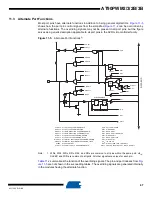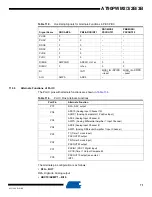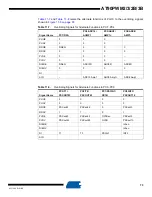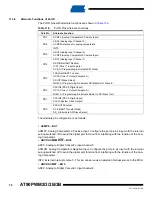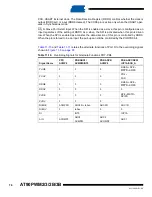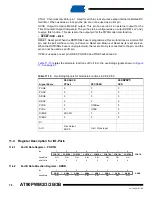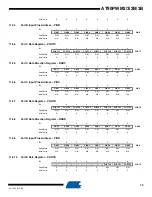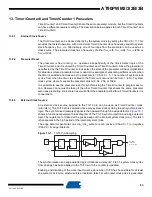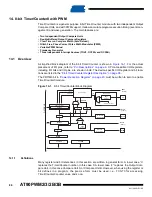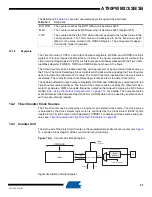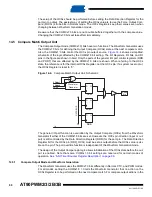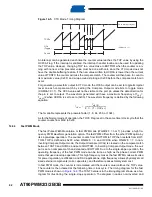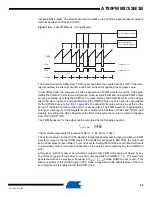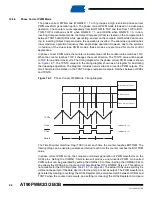
81
4317I–AVR–01/08
AT90PWM2/3/2B/3B
12. External Interrupts
The External Interrupts are triggered by the INT3:0 pins. Observe that, if enabled, the interrupts
will trigger even if the INT3:0 pins are configured as outputs. This feature provides a way of gen-
erating a software interrupt. The External Interrupts can be triggered by a falling or rising edge or
a low level. This is set up as indicated in the specification for the External Interrupt Control Reg-
isters – EICRA (INT3:0). When the external interrupt is enabled and is configured as level
triggered, the interrupt will trigger as long as the pin is held low. Note that recognition of falling or
rising edge interrupts on INT3:0 requires the presence of an I/O clock, described in
tems and their Distribution” on page 29
. The I/O clock is halted in all sleep modes except Idle
mode.
Note that if a level triggered interrupt is used for wake-up from Power-down mode, the changed
level must be held for some time to wake up the MCU. This makes the MCU less sensitive to
noise. The changed level is sampled twice by the Watchdog Oscillator clock. The period of the
Watchdog Oscillator is 1 µs (nominal) at 5.0V and 25
°
C. The frequency of the Watchdog Oscilla-
tor is voltage dependent as shown in the
“Electrical Characteristics(1)” on page 299
. The MCU
will wake up if the input has the required level during this sampling or if it is held until the end of
the start-up time. The start-up time is defined by the SUT fuses as described in
. If the level is sampled twice by the Watchdog Oscillator clock but disappears before
the end of the start-up time, the MCU will still wake up, but no interrupt will be generated. The
required level must be held long enough for the MCU to complete the wake up to trigger the level
interrupt.
12.0.1
External Interrupt Control Register A – EICRA
• Bits 7..0 – ISC31, ISC30 – ISC01, ISC00: External Interrupt 3 - 0 Sense Control Bits
The External Interrupts 3 - 0 are activated by the external pins INT3:0 if the SREG I-flag and the
corresponding interrupt mask in the EIMSK is set. The level and edges on the external pins that
activate the interrupts are defined in
. Edges on INT3..INT0 are registered asynchro-
nously.The value on the INT3:0 pins are sampled before detecting edges. If edge or toggle
interrupt is selected, pulses that last longer than one clock period will generate an interrupt.
Shorter pulses are not guaranteed to generate an interrupt. Observe that CPU clock frequency
can be lower than the XTAL frequency if the XTAL divider is enabled. If low level interrupt is
selected, the low level must be held until the completion of the currently executing instruction to
generate an interrupt. If enabled, a level triggered interrupt will generate an interrupt request as
long as the pin is held low.
Bit
7
6
5
4
3
2
1
0
ISC31
ISC30
ISC21
ISC20
ISC11
ISC10
ISC01
ISC00
EICRA
Read/Write
R/W
R/W
R/W
R/W
R/W
R/W
R/W
R/W
Initial Value
0
0
0
0
0
0
0
0
Table 12-1.
Interrupt Sense Control
ISCn1
ISCn0
Description
0
0
The low level of INTn generates an interrupt request.
0
1
Any logical change on INTn generates an interrupt request
1
0
The falling edge between two samples of INTn generates an interrupt request.
1
1
The rising edge between two samples of INTn generates an interrupt request.

